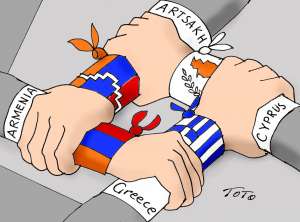 As the European Union (EU) bowed down to Turkish demands and brought Turkey’s accession talks with the union a step closer, Armenia’s President Serge Sargisian paid official visits to Greece and Cyprus, whose rights were trampled by the other members of the EU.
As the European Union (EU) bowed down to Turkish demands and brought Turkey’s accession talks with the union a step closer, Armenia’s President Serge Sargisian paid official visits to Greece and Cyprus, whose rights were trampled by the other members of the EU.
It was an opportunity to express solidarity with those two friendly countries and to develop further bilateral relations.
Turkey has occupied 38 percent of Cyprus’ territory, established a client state on the northern part of the island and to add insult to injury, refuses to recognize the legitimate government of Cyprus as a sovereign state. And yet, the EU is compromising the sovereign rights of one of its own members, namely Cyprus, to settle the temporary issue of the refugees, which was Ankara’s making to begin with.
A Greek representative of the EU Parliament, Gen. Eleftherios Synadinos, has been politically incorrect at one of the sessions, by expressing his outrage on the EU conduct vis-à-vis Turkey, making the following statement in a speech: “Mr. President, the day before yesterday, a summit was held between the European Union and Turkey. The results of this weren’t just disappointing but a diplomatic Waterloo for the Union leaders. Twenty-eight Turk-loving leaders with dwarf stature sat and listened to a cruel blackmailer, a common crook, Davutoglu, imposing conditions for surrender and submission … You have sold yourselves out to the Ottoman Erdogan.”
He also spiced his speech with more colorful language, for which the parliament has expelled him as a “racist.”
The Greek Parliamentarian had certainly predicted the outcome of his speech, but at least, he made sure that EU members got what they deserved.
Turkey has been bullying Cyprus since its 1974 aggression and the EU is continuing to accommodate the bully. Ankara is trying to have the same principle in both ways. It has occupied Cyprus under the pretext of protecting the Turkish minority there, while fighting tooth and nail in denying the right of self-determination to Armenians in Karabagh.
Although Armenians and Greeks have suffered under the yoke of the Turks and they have experienced the genocidal policy of the same power, they have not developed their policies to their full capacity yet.
The same could be said about the lobbying endeavors in the US and Europe. While Greek and Armenian groups face the same political challenges, they realize that they are against the same dangers and they cooperate occasionally but that cooperation seldom develops into a permanent common cause.
Perhaps that was the reason for Armenia’s president visit to the two friendly countries, especially in view of the fact that Turkey, Azerbaijan and Georgia cooperate permanently to isolate Armenia in the region.
The political moment was also right to take that concrete step; on the one hand, Armenia being a member of the Eurasian Customs Union is viewed as it serving as a bridge between the EU and that union and on the other hand, Armenia’s close relationship with (embargo free) Iran creates a potential for economic development between Armenia, Greece and Iran.
During the Armenian President’s visit to Athens, Greek Prime Minister Alexis Tsipras said that he considered the Iran-Armenia-Greece collaboration to be a prospect that needed to be developed. He added that Greece sees opportunities also in the establishment of cooperation between the European Union and the Eurasian Economic Union and wishes to contribute to this objective. In addition he expressed his readiness to assist in the development of closer relations between Armenia and the EU.
It was also revealed that the legal framework of bilateral relations is quite wide. It covers more than 40 agreements of cooperation in the economic, military, cultural, scientific healthcare, communication, tourism and other sectors.
Armenia with its limited resources, never dared to move beyond its immediate neighborhood while other political configurations have been developing in the Middle East which may impact Armenia’s plight directly and indirectly. While citing the Armenia-Greece-Iran cooperation format, Tsipras observed that his country has experience in such trilateral cooperation in Greece-Cyprus-Israel and Greece-Cyprus-Egypt formats which he said have worked efficiently.
As the EU and the US back Turkey at the expense of Greece and Cyprus, the latter have been developing their own blocs to counter Turkey’s ambitions. The common factor that brings Greece, Cyprus and Israel together is the gas reserves discovered recently under the Mediterranean.
When Cyprus and Israel began exploring the undersea gas deposits, Turkey bullied them with armed intervention. But as its problems with its neighbors got overbearing, Ankara backed down.
During former Egyptian President Mohamed Morsi’s Islamic government, Turkey had come dangerously close to Egypt. But after the takeover by Gen. Abdulatif Sisi’s military regime, Egyptian-Turkish relations can best be described as acrimonious.
Therefore by promoting relations with Cyprus and Greece, Armenia can weave its policies throughout the web of those international relations.
During Mr. Sargisian’s visit to Greece and Cyprus, the topic of the Genocide was discussed. Armenia thanked both countries for recognizing the Genocide. In addition, special thanks were extended to Cyprus which has also adopted laws criminalizing Genocide denial.
Predictably, Turkey’s Foreign Ministry reacted angrily to the statements by President Sargisian and Greek President Prokopis Pavlopoulos about the Genocide.
Both in Nicosia and in Athens there were expressions of mutual support for the Karabagh and Cyprus problems.
Armenia’s close relations with the two EU members will certainly enhance its foreign policy and liberate the country from its choking isolation.















